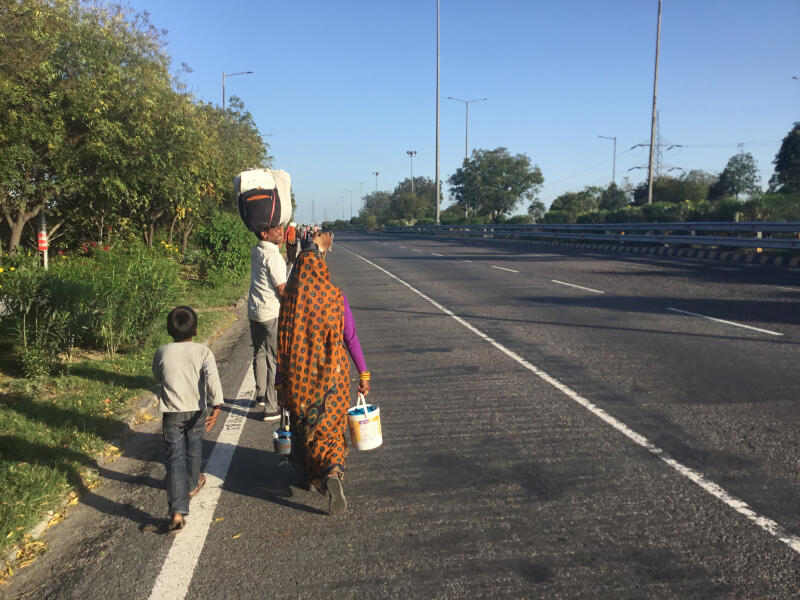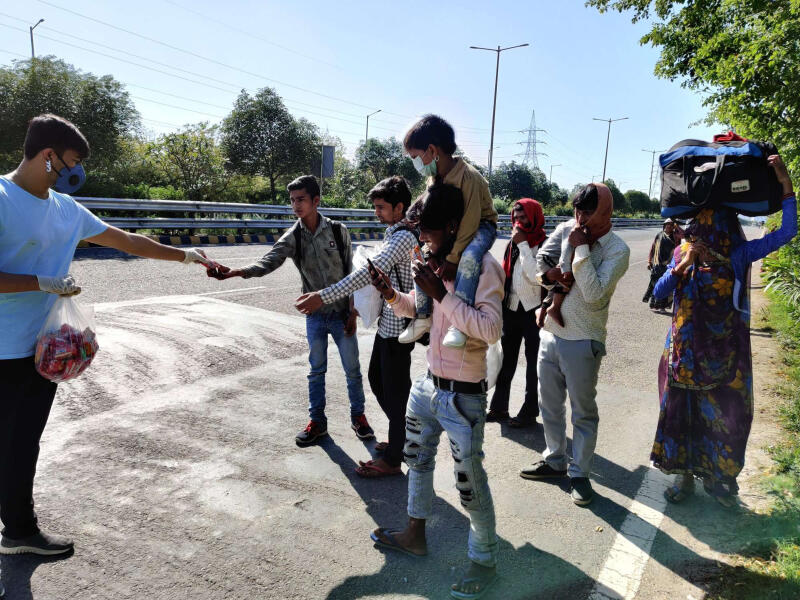Coronavirus: Daily wage workers in India brave long walk home amid lockdown
Sign up now: Get insights on Asia's fast-moving developments
NEW DELHI - Delivery rider Mohammed Riyaz, 19 years old and the eldest of four siblings, was sent away by his family in Bihar even before he turned a teenager; they wanted him to earn and help feed them.
He has been doing so faithfully for the last several years, ferrying goods in Delhi on his reliable cycle cart. It hasn't let him down so far; Mr Riyaz hopes it won't either this coming week.
It is on his cart that he has set out for his home, forced by a 21-day lockdown imposed by the government from midnight March 24. The order came with just four hours' notice, crippling millions of daily wage workers in India's cities who suddenly found they had no way to earn their livelihoods or return home with passenger transport already blocked.
Stranded without work for eight days and evicted from his dwelling, Mr Riyaz said he had no alternative but to pedal the 1,000-odd kilometres between Delhi and his home in Bihar's Supaul district.
"We are dying here because of hunger. What are we going to eat if we don't earn," he told The Straits Times on Saturday (March 28), as he and his friends took a break on an expressway.
He and his group are, however, among the lucky ones. They won't have to walk. Helpless daily wage workers - hundreds of thousands of them - have begun heading out from India's cities on their feet since the lockdown, prompting criticism of a poorly planned policy that had failed to anticipate the tragic impact it would have on daily wage workers as well as prepare for the fallout.
The sudden decision has shattered their fragile daily existence; what they ate at night often depended on their earnings during the day.
The coronavirus is still a distant threat but hunger, on the contrary, has always been a more immediate death risk, more so now than ever before.
"How can we stay back?" asked Mr Vijay Singh, 24, who worked at a construction site earning around 350 rupees (S$6.70) a day.

He has been unable to find work for more than three weeks and with only 250 or so rupees left, Mr Singh decided he had to lock up his shanty and walk back home with his wife, four-year-old son and brother-in-law in tow.
"The authorities might feed us for a few days but no one is going to look after us beyond that. We will be beaten with lathis and arrested if we head out for work," he added.
The family are headed for Mahoba in Uttar Pradesh, a distance of nearly 500 kilometres.
The flight of migrants over the past few days has forced state governments across the country to scramble and arrange for buses to ferry as many people as possible. Videos widely shared on social media from a bus terminal in Anand Vihar near the Delhi-Uttar Pradesh border showed thousands of migrants waiting desperately for buses on Saturday.

Those who could had even marshalled tractors, cranes and pushcarts that were hitched to motorcycles.
The government has brushed aside criticism that the lockdown has been poorly planned. A statement on Sunday said the movement of people should be prevented with orders issued again to seal state and district borders.
It has also asked state governments to ensure adequate food and shelter are made available where the migrant labourers work and ensure wages are continued to be paid.
As these migrants continue their journey, more are also likely to die because of exhaustion, hunger and road crashes than from Covid-19.
On Saturday, Mr Ranveer Singh, a delivery agent who had walked for more than 200 kilometres, died of a cardiac arrest. He was 80 kilometres from his home. Reports of migrants being run over by speeding vehicles on highways have also come in with frightening frequency. At least 17 have been killed so far in three different crashes.
PM Narendra Modi was contrite in his monthly radio address on Sunday, where he apologised, especially to the poor, for the tough decision to impose a lockdown: "I understand your troubles but there was no other way to wage a war against corona for a country like India with a population of 1.3 billion."
But many who have hit the road think Mr Modi could have given them some time before imposing the lockdown.
"We should have at least got a day's notice. This way we could have left on a bus," said Mr Naveen Kanojia, 23, who was more than 300 kilometres away from his home in Uttar Pradesh's Etawah district, and walked past an apartment block he had helped build.
The crisis, meanwhile, has moved many locals to come out and help those walking back home. Mr Pankul Jain, a resident near Delhi, has been doing the rounds with some other volunteers feeding the local poor as well as migrants in recent days.
"The good thing is that there are many people who have showed up in their cars distributing food to them," he said, adding that on Sunday he must have seen thousands walking back home but not a single bus.


